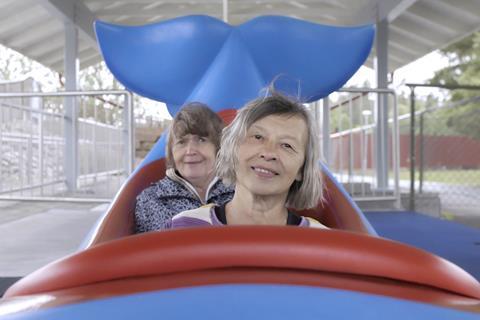Twisting Swedish documentary about a quirky family and their ever-evolving history

Dir. Maria Fredriksson. Sweden/Norway/Denmark 2023. 108mins
A strange film about strange people and even stranger events, The Gullspång Miracle is one of the twistiest documentaries this side of Three Identical Strangers, although that’s where the comparison ends. Director Maria Fredriksson is a withholder of information, certainly, but even still the fate of the Swedish/Norwegian family she follows here goes beyond the unexpected. A documentary that looks – and is – as quirky as its main players, The Gullspång Miracle bows at Tribeca before heading to Sheffield at the start of what should be a strong festival run. Word of mouth will be critical to its success, given how hard it is to parse with such radical shifts of events taking place. A lack of streamer-style pacing will endear it to many and, ultimately, distinguish it.
The point of the piece is that there are no tidy solutions to who we are, really
It starts – with small detours including an out-of-season amusement park and a broken tailbone – with two elderly sisters searching for a still life, a ‘fruit painting’ in the small Swedish town of Gullspång - and suddenly leaps back 80 years to wartime Norway and the birth of twin girls to a poor farmer. Fredriksson’s film then lurches forward again to a suicide which took place in 1988, and, with various plates still spinning, an abrupt reversal in what is taking place in the ‘present day’.
The clan at the heart of Fredriksson’s story are a little odd, partly because they are so deeply pious: country folk with an aversion to make-up and jewellery and a clear sense that what is happening to them is a miracle. But also, they’re such distinct characters: naive, wide-eyed Kari and sharp-tongued May. The ball starts rolling when they call up documentarian Fredriksson with joy to tell their story: she gets them to re-stage what happens for her camera (although unseen, she is often heard giving direction or even exclaiming with frustration as the narrative moves from a recap of events to a whole new ballpark.)
When the sisters eventually find their fruit painting, it turns out to be owned by the octogenarian Olaug – who bears a striking resemblance to their late half-sister Lita. Olaug was even nicknamed Lita by her parents. Co-incidence? A DNA test reveals that Olaug is Mai and Kari’s half-sister, and Lita’s twin. Born in Occupied Norway, Lita and Olaug were separated at birth. Given the Nazi’s obsession about experimenting with twins, one girl was smuggled out of the house, to be fostered, and the other, Lita, went on to live a life which included a close relationship with half-sisters Kari and Mai and a large, boisterous family. Olaug, meanwhile, has had a posher upbringing, is given to wearing leather pants and funky earrings, and sits at home sipping wine surrounded by her objets.
This, however, is only half the story. In short order Olaug (equipped with a ‘very high’ IQ) spends time in the caravan on the family farm in Norway with some new hillbilly relatives and reassesses how keen she is to change her identity, while questions start to emerge about Lita’s so-called suicide. To say more would be criminal, especially as the point of the piece is that there are no tidy solutions to who we are, really. If there’s a star here it’s Kari, who operates without a cynical bone in her god-fearing body, unlike the rest of the clan – new and old – and Lita’s daughter, also a genuine presence.
The protagonists of The Gullspång Miracle are not people you meet every day. Sometimes it’s hard to figure out whether they are really as they claim to be. It’s disconcerting even as the narrative spins off into sidebars. And at first Fredriksson’s vocal presence in the film is awkward and unusual. But the score, by Jonas Colstrup (The Square) helps pull all these mini rollercoasters together. Later, Fredriksson’s voice becomes a substitute for the viewer. “I’m really upset!” she exclaims. She’s certainly not alone.
Production company: Ballad Film
International sales: Met Film, jenny@metfilm.co.uk
Producers: Ina Holmqvist
Cinematography: Pia Leto
Editing: Mark Bukdahl, Orvar Anklew
Music: Jonas Colstrup






![The Brightest SunScreen[Courtesy HKIFF]](https://d1nslcd7m2225b.cloudfront.net/Pictures/274x183/3/5/0/1448350_thebrightestsunscreencourtesyhkiff_312678.jpg)












![The Brightest SunScreen[Courtesy HKIFF]](https://d1nslcd7m2225b.cloudfront.net/Pictures/100x67/3/5/0/1448350_thebrightestsunscreencourtesyhkiff_312678.jpg)




